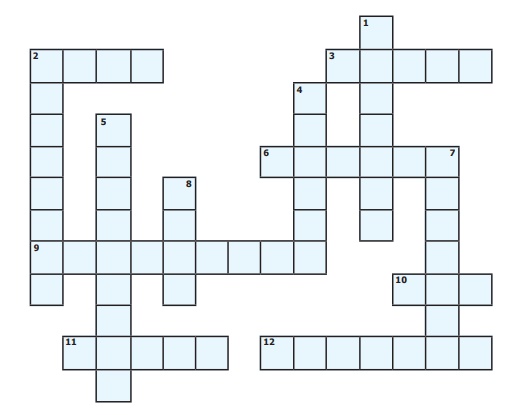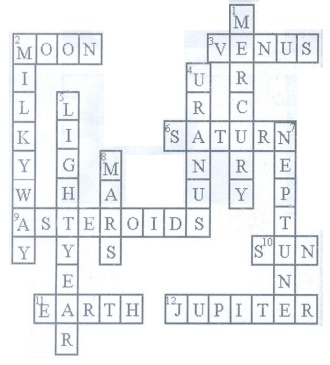English : Unit 6 : Poem : The Comet – by Norman Littleford
Warm up
Fill in the crossword puzzle using the clues given below.

ACROSS
2. Earth’s only natural satellite
3. Morning star
6. Titan is the largest moon of ____
9. Smaller bodies in orbit around the Sun
10. The star at the centre of solar system
11. The Blue planet
12. Largest planet in the solar system
DOWN
1. Smallest planet in the Solar system
2. Our Galaxy
4. Seventh planet from the sun
5. Distance travelled by light in a vacuum in one tropical year
7. Farthest planet in the Solar system
8. The Red planet
Answer:


Glossary
rampaging (v) – going through an area making a lot of noise and causing damage
spectacle (n)- an unusual or unexpected event or situation that attracts attention,
interest
comet (n)- an icy small Solar body, which when passing close to the Sun, warms and begins to release gases that are seen on rare occasions from the earth as a bright line in the sky
trail (n)- a path often made or used for a particular purpose
quake (v)- a sudden violent movement of the earth’s surface, some times causing great damage (short form of earthquake).
A. Memorise the first three stanzas of the poem.
Rampaging through the heavens
Never stopping day or night,
A spectacle of a lifetime
A comet in full flight.
Faster than a cheetah
With a tail that’s miles long,
Bigger than a mountain
So powerful and strong.
The outer ice is melting
Causing vapor from the force,
And leaves a trail behind it
As it travels on its course. – by Norman Littleford
B. Read the following lines and answer the questions.
1. Rampaging through the heavens
Never stopping day or night,
a. How does the comet travel?
The comet travels fast without stopping.
b. Which word could you replace ‘rampaging’ with?
a. charging
b. rolling
c. speeding
d. flying
Answer: speeding
2. Faster than a cheetah
With a tail that’s miles long,
a. Why is the comet compared to a cheetah?
The comet is compared to a cheetah for its speed.
b. Whose tail is compared here?
The tail of the comet is compared here.
3. With shockwave reaching to the ground
Causing the land to quake
a. What is reaching to the ground?
The shockwave is reaching the ground.
b. What is causing the land to quake?
The shockwave is causing the land to quake.
4. In the dust they leave behind,
Could have started life on the earth
Which resulted in mankind
a. What does the word ‘they’ refer to?
The word ‘they’ refer to the comets.
b. According to scientists, how did life start on earth?
According to the scientists, life started on earth from the dust.
5. But I know no better spectacle
Than a comet in full flight.
a. Who does ‘I’ refer to?
‘I’ refer to the poet.
b. What is the best spectacle mentioned in the above lines?
The flight of the comet is the best spectacle mentioned in the above lines.
C. Complete the summary by filling in the given spaces with suitable words/ phrases given below
a trail, spectacular, spectacular scene, outer ice, a cheetah, day or night, emerging of life powerful and strong, shock wave, scientists
The poet describes a moving comet which speeds through the heavens and never takes a break by day or night. When a comet is in full flight, it gives a spectacular scene which can never be compared to anything else for a lifetime. The comet is compared to a cheetah for its speed and a mountain as it is powerful and strong. The outer ice melts which causes a vapour from the force and leaves behind a trail as it travels on its way. If it comes very close to the atmosphere, it causes a shake which in turn produces a shock wave that reach the Earth’s surface. According to the scientist the comets leave behind chemicals in the form of dust which resulted in the emerging of life on earth and mankind came into existence. But the poet is not sure whether this principle is true or not but he knows for sure that whatever the truth may be, the sight of the comet in full flight is spectacular.
D. Poem appreciation
If one should come too close to earth
The atmosphere will shake,
With shock wave reaching to the ground
Causing the land to quake.
1. Pick out the rhyming words.
Answer: Shake, quake.
2. Mention the rhyme scheme of the stanza.
Answer: Rhyme scheme is a b c b.
3. When you read the poem aloud, you can feel/hear a rhythm. What according to you gives rhythm to the poem- the rhyme or the words in a line? Support your answer with examples from the poem.
While we are reading the poem, we come to know that it is a poem about the comet. The poem has six stanza and each stanza consists of four lines. In every stanza of the poem only the second and the fourth lines are rhyming. The other lines of each stanza do not rhyme. The first and the third lines do not rhyme at all. If we consider the poem stanza wise, the lines are metered uniformly. The rhyme scheme of each stanza is abcb. The poet has used the simple language to make the readers to enjoy the poem meaningfully.
E. Answer the following questions in about 80-100 words.
1. Narrate how the poet describes the comet.
Title : The Comet (Poem)
Author : Norman Littleford (Poet)
Characters : Poet and Comet.
Theme : Comets are like libraries storing the record of our formation in tiny particles.
Norman Littleford describes a moving comet in his poem. It speeds through, the heavens never stopping day or night. In its full flight, the comet gives a spectacle and it has no comparison to anything else. It is compared to a cheetah for its speed. It is stronger and more powerful than a mountain. The outer ice melts causing a vapour and leaving a trail as it travels. Coming close to the atmosphere it cause a shake with shock waves resulting an earth quake. The scientists say that the comets leave behind chemicals as dust and it produced life on earth. But the poet is doubtful if it is true or not. However he is certain that the comet in full flight is the best, spectacular scene.
“A Comet is an incomparable spectacle”.
2. Give a detailed account of the various effects caused by the comet to the earth.
Title : The Comet (Poem)
Author : Norman Littleford (Poet)
Characters : Poet and Comet.
Theme : Comets are like libraries storing the record of our formation in tiny particles.
A comet is a ball of mostly ice that moves around in outer space. It travels at a great speed on its way. The comet is big in size and very powerful and strong. If the comet comes very close to the earth, the atmosphere will shake. The shockwave reaches the ground. It certainly causes the land to quake. The comet leaves behind the chemicals in the form of dust. Then the life started on the earth. And it resulted in mankind. The poet is not sure if this is true or not. But he is confident that there is no better spectacular scene than a comet in full flight.
COMMON PARAGRAPH
PARAGRAPH FOR TOPPERS:
Synopsis:
• Introduction
• The comet
• The trail
• Effect on earth
• Spectacle of life
• Conclusion
Introduction:
The poem ‘The comet’ written by Norman Littleford. His poem focused on life and nature. The poet sees the comet is a wonderful spectacle in the sky. Let us see them in detail.
The comet:
The poet is out in the open. He sees a bright object with a tail in the sky. He finds it a comet. The comet is a big star. It is bigger than a mountain. It is strong and powerful. The comet has a long tail. It is many miles long. The comet travels non-stop day and night. It never takes a break. The comet travels faster than the cheetah.
The trail:
The outside of the comet is covered with ice. When the comet comes close to the sun, the ice melts. Water vapour is forced out. It leaves a long bright trail behind the comet.
Effect on earth:
At times it comes close to the earth. At such times, the atmosphere begins to shake. The shock waves do not stop here. They reach to the ground. As a result the land cause earthquake.
Spectacle of life:
The comet leaves behind the dust. The dust contains chemicals. It is said that life on earth emerged from the chemical. Thus mankind came into existence.
Conclusion:
The poet is not sure about it. But he enjoys the spectacular sight of the comet in full flight. The poet writes in simple poem but deep in thought.
PARAGRAPH FOR AVERAGE STUDENTS:
Title : The Comet (Poem)
Author : Norman Littieford (Poet)
Theme : Comets are like libraries storing the record of our formation in tiny particles.
The poet is out in the open. He sees a bright object with a tail in the sky. He finds it a comet. The comet is a big star. It is bigger than mountain. It is strong and powerful. The comet has a long tail. The comet travels non-stop day and night. The comet travels faster than cheetah. The out side of the comet is covered with ice. When the comet comes close to the sun the ice melts. At times it comes close to the earth. As a result the land cause the earthquake. The comet leaves behind the dust. The dust contains chemicals. It is said that life on earth emerged from the chemical. Thus mankind came into existence.
PARAGRAPH FOR LATE BLOOMERS:
• The comet is a big star.
• It is bigger than mountain.
• It has a long tail.
• It travels non-stop day and night.
• It travels faster than cheetah.
• It comes close to the sun, the ice melts.
• It comes close to the earth, cause the earthquake.
• The comet leaves behind the dust.
• The life on earth emerged from the chemical.
LISTENING
F. Listen to the passage on ‘Comet’ and fill in the blanks by choosing the correct answer.
Comets, meteors and asteroids have several things in common. First, they are believed to be remnants of the materials that created the Sun and the planets. Basically, they’re leftovers. Comets, meteors and asteroids are too small to be planets. Some are only a few feet in size, while others are a mile or more long.
Comets are mostly made of ice. They are very old. As comets travel close to the Sun, some of the ice melts off and becomes a gas. This melting process causes bits of dust and debris to trail behind the comet. This tail can be seen in the night sky as a bright, quickly-moving light.
Comets orbit at the very edge of the galaxy, past Pluto.
1. Comets are believed to be remnants of the materials created by the Sun.
a. Moon
b. Sun
c. star
d. asteroids
2. Comets are mostly made of ice.
a. dust
b. ice
c. sand
d. snow
3. The tail can be seen in the night sky as a bright, quickly-moving light.
a. head
b. star
c. tail
d. wings
4. Comets orbit at the very edge of the galaxy, past the pluto.
a. Earth
b. Neptune
c. Pluto
d. Saturn
5. State whether the statement is true or false.
The melting process causes bits of dust and debris to trail behind the comet. Answer: True
SPEAKING
G. Imagine you are interviewing an astronaut about his/her experiences in space. Select a partner to be an astronaut and present the interview as a role-play in front of the class.
“Interviewing an astronaut”
You : We are lucky to welcome you sir. I would like to ask you a few questions.
Astronaut: Thank you. It’ll be my pleasure to answer your questions.
You: What is the view like from space?
Astronaut: The first time you look out the window once you’re in space,
I think the reaction of every astronaut is the same; first there’s a huge gap.
It goes ‘AW, Vow!’ You just can’t believe what you’re looking at.
I was amazed at the blackness of space. It was a darker, richer colour than I had ever seen before.
You: What are the best views of Earth from space?
Astronaut: I always loved passing over Egypt. To see the Nile River the bright green path way cutting through the centre of Egypt was just spectacular.
You see the blue water of the Mediterranean and the brown desert areas.
This contrast between, green and bright blue was just breath taking and, because I had been there on Earth, it was extra special for me to see from space.
You: What’s the in – flight food and entertainment like on a space craft?
Astronaut: The food is not good, but its not horrible. I think the most popular entertainment for astronauts is looking out the window. I love sitting near the window and just watching the Earth go by.
You: Do you think space is the future of travel?
Astronaut: Space tourism is definitely coming and we’re very close to it.
I think there’s going to be a long line of people who want to get in on that.
The more people that can get up to space to look back at planet Earth,
I think the better off we’re all going to be.
I wanted everybody to see the perspective that I just had.
WRITING
H. Imagine that you and your friend get a chance to visit another planet. There, you befriend an alien who takes you around the planet. After reaching the earth, write a letter thanking him for all the help he did.
Dear alien,
We landed on the earth safely. It was an amazing experience to travel in space. My friend and I were very lucky to be a friend of you in the strange planet. We felt at home after meeting in the new planet. But for your help, we could not have made our visit a success. We are very thankful to you for your friendship and entertainment. We have enough confidence to make another visit there as you are there to host us. We are heartened to feel that we are not alone in the universe. We are sure that you are friendly beings, as we have observed you all. We invite you to visit us. Please come and live among us and share your wisdom with us. We do really need it. If you come to earth, I am sure that you would like it. On behalf of all humanity I welcome you to Earth.
Looking forward to your early arrival.
Yours Sincerely,
Jegan Kumar.














